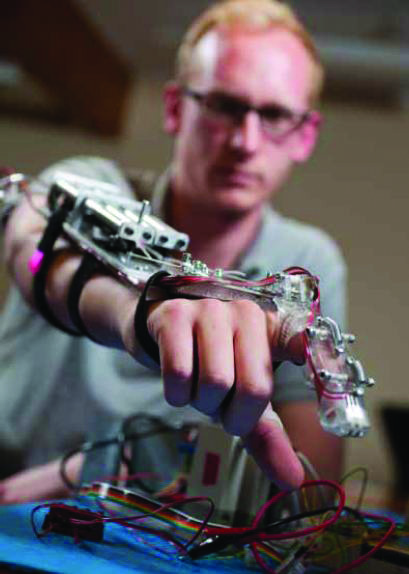
There’s more than one way to crack an egg. We talk to the four finalists in this year’s James & Wells Best Commercialisation of IP category of the New Zealand International Business Awards to find out how they each commercialise their IP – and what they keep right away from.
Argenta has grown from two people to 220 in a decade, inventing products and technologies, and licensing those to multinational pharmaceutical companies in the animal health sector.
“The success in that is heavily reliant on ability to commercialise an idea – it’s what we do,” says Argenta chief executive officer Doug Cleverly.
“We employ 65 scientists, because there’s more science involved in commercialising something than inventing something. To make something into sellable product, commercialisation is where you need the heavy lifting.”
And with face-to-face quarterly R&D meetings with marketers from the top 10 pharmaceutical companies on the planet, Argenta gains easy insight into where it needs to head.
Cleverly says vertical integration is what gives Argenta the edge – that is, filling the gaps in the invention-to-market process that big pharmaceuticals are now not doing themselves. The big pharmaceutical companies discover the drugs and sell them, but Argenta does the development, commercialisation and manufacturing required in between.
“We’re vertically integrating where our clients are disintegrating,” Cleverly says.
Service, not just the product, seems key to ongoing success. With major clients in Europe, Cleverly says Argenta is 15-20 percent more expensive than its competitors, but provides 70-100 percent more service.
“Value proposition – to me that’s where New Zealand needs to be,” says Cleverly.
“This whole number eight wire thing is cool, but the ‘she’ll be right’ is catastrophic. It’s just gotta go. Because if you demonstrate excellence and that you’re looking after your clients interests, you can be on the bloody moon
and still do well.”
From rendering movies, to sequencing DNA, GreenButton has discovered the secret to getting software vendors’ (such as SAP or Pixar) products working in the cloud – and providing a way for them to make money from it.
GreenButton’s most treasured IP is around predicting how long a job can take with different computing speeds; staff are able to present clients with a sliding scale of quotes (speed versus cost), before running an app across up to tens of thousands of processors in the cloud on their platform.
“We’ve focused our efforts on demystifying or removing all the complex processes involved in such an inherently complex space,” says GreenButton CTO Dave Fellows. “We’ve focused on making the user interface really slick, making it push-a-button and all the complexities are handled for you. It clearly differentiates us from other companies, which have focused on technical aspects.”
Fellows says in GreenButton’s industry, a lot of companies are focusing on IP, but missing the mark because they’re not looking at trends in the market. He says it’s not just technical problems that need to be solved, it’s the things surrounding data management, like governance and managing on-going costs.
“Those are the areas businesses are most concerned about, not necessarily the technical challenges.”
 ?Auckland UniServices, the commercialisation arm of the University of Auckland, is a behemoth, representing about 50 percent
?Auckland UniServices, the commercialisation arm of the University of Auckland, is a behemoth, representing about 50 percent
of the patents granted each year to New Zealand’s universities and research organisations – it’s created more than 230 licences and last year turned over $13 million in commercialisation revenues.
Read more: UniServices boss going out on a high
“We’re involved before invention, after the ‘a-ha’ moment, all the way through to a commercial realisation of that invention,” says chief executive officer Dr Andy Shenk.
In judging ideas, UniServices uses industry experts on three investment committees: ICT, life sciences and physical sciences.
Functioning like a massive company board, these experts are successful businesspeople who have done the whole shebang themselves. And they’re impartial – they’ll call a no-hope idea a no-hoper.
“I’m not sure if any other organisations in New Zealand have this level of independent insight into the development of IP that we have,” says Shenk.
Often, a particular asset will have many opportunities associated with it.
“If you don’t cover these off [before you license it], you’re leaving options open to whoever has this first license,” Shenk says. “Our preference is to understand and value appropriately the option the client is looking for and preserve for the university’s benefit the other options.”
They also try to license it first to a company and application that will best demonstrate the invention’s capabilities. If no company is willing to take the lead, UniServices will create a startup itself.
Now the top brand in digital DJing, Serato’s business model of selling IP-rich software licenses is working for them nicely.
IP is the bread and butter of the company; Serato educates all new software engineers about the value of IP and about completing invention disclosure forms. Its patents include the Pitch ’n Time algorithm, which is still industry standard in its field, and the music delivery service Whitelabel.net.
“All our IP-generating efforts are based on market needs – we wouldn’t do research for the sake of it,” says Serato commercial manager Arturas Vedrickas.
“First we investigate the market potential of a solution and only then do we do the research and file a patent. Otherwise, patents would just sit there without anyone wanting them.”




